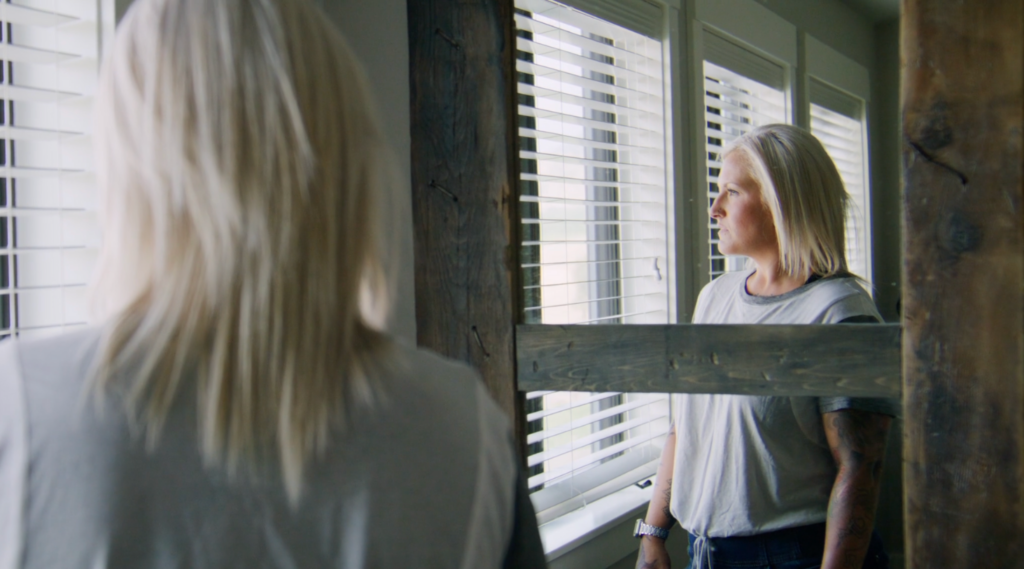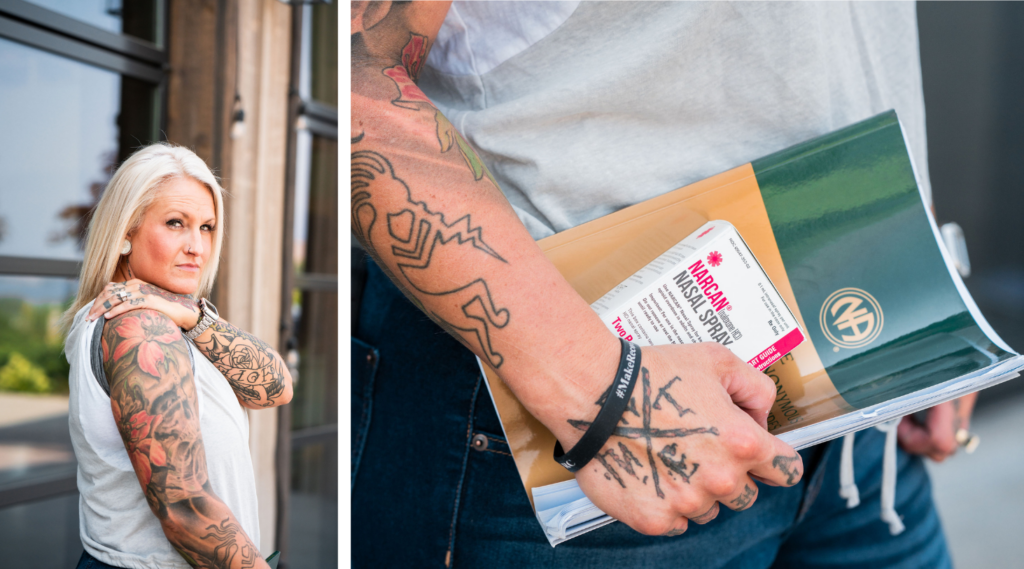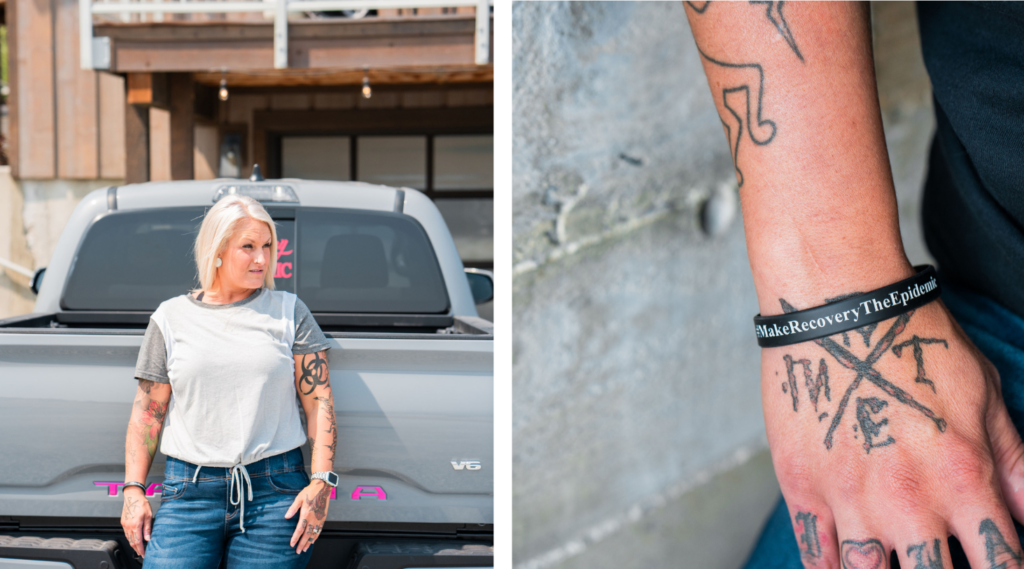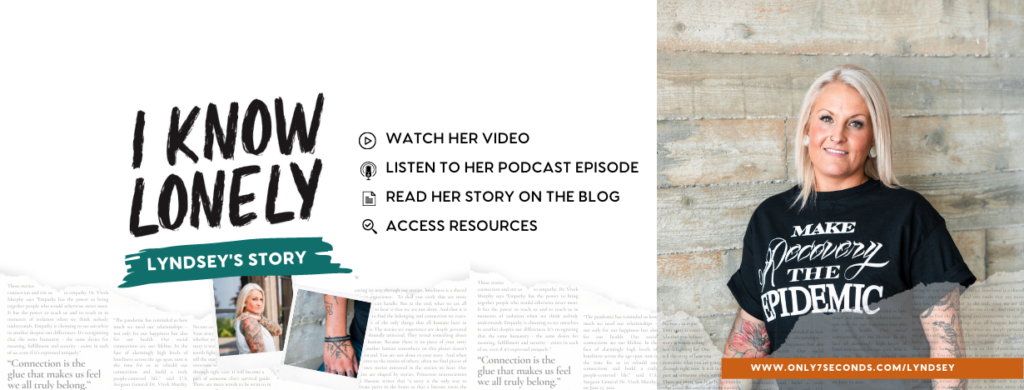Lyndsey Sprinkle introduces herself as “an addict in long-term recovery.” She grew up in the Puget Sound area and came from a well-off family. When she was 15 years old, her boyfriend’s sister who was driving hit black ice on the pass between Wenatchee and Seattle. The vehicle went off the road, rolled into the river, and smashed into a tree. “They had to cut me out of the car with the jaws of life. I was in a coma and on life support and they airlifted me to Wenatchee Valley.”
After her parents got to the hospital, doctors told her parents that Lyndsey would be a vegetable the rest of her life and that she’d never be able to walk and talk again. When she woke up from her coma, Lyndsey’s brain was swollen and bleeding, so the doctors put her in a drug-induced coma to prevent any more brain damage. She was then transported to Good Samaritan Brain Trauma Center in Puyallup.
“That’s where I came out of the coma. It took a long time in there learning basic skills, how to walk again, how to talk again. I didn’t remember anything from before the accident. I didn’t know who my parents were. I didn’t know who anybody was,” Lyndsey remembers.
After Lyndsey was released, she was in a wheelchair; she couldn’t walk and couldn’t move her hand, and had to go to therapy every single day. “I hated doing that. I didn’t want to do anything besides go back to school.” Lyndsey’s medical team and parents told her when she learned to walk, they’d let her go back to school. “That was my only motivation to learn how to walk because I wouldn’t do anything that they were trying to get me to do.”
Once Lyndsey learned how to walk, they sent her back to school in special education. At 15 or 16 years old, Lyndsey didn’t know how to write and didn’t know how to talk at the time.
A year and a half after the accident, Lyndsey went back to school full time. Around this time, Lyndsey’s back problems began. She started smoking weed and taking pain pills when she could get them to manage the pain. “As soon as I turned 18, I could do whatever I wanted and that was kind of where my whole addiction all started.”
Lyndsey went to beauty school after she graduated high school. This only intensified her back pain. “Before I knew it, my body had become so dependent on pain pills that I turned to heroin.”
“Being on pain pills at the time, I didn’t really know what addiction consisted of. After filling prescription after prescription and taking them [the pills] faster than I was supposed to and more than I was supposed to, so I started buying pills off the street. Once I started buying pills off the street, then I started meeting all the dope dealers and I started meeting all the people that were slinging pills. And then I thought I was cool, you know, that I could get all these pills from people and the pride and the ego started going and I was like ‘I could totally start selling pills too’, and I could make way more money.”
Lyndsey started selling pills to cover the cost of her addiction. “That didn’t last very long because, before I knew it, heroin was way cheaper.” She closed her hair salon, and got clean for six years, before she relapsed back to heroin. After her relapse, Lyndsey took her daughter and moved to Arizona. “I knew that if I left Balfour and I got out of the Puget Sound and I went away from everybody, that I’d be able to get clean and stay clean and start life fresh… I was sadly mistaken because as soon as I got to Arizona, it was five times worse.
“That was kind of where I began to realize drugs are everywhere. It doesn’t matter where you go. If you want recovery, you have to find recovery, and you have to change your people, your places and your things.”
She began selling pills and using heroin again. She got married and was clean while pregnant with her youngest daughter. But after Lyndsey’s youngest daughter was born, she moved back to Washington state. “Two weeks after I was back in Washington, I was on the run again. I left my daughter at her grandparents’ house. I was gone and I took off and it was a bad run that I was on for about three years.” Lyndsey’s daughter was only six months old.
“It had taken over my life so bad that nothing mattered besides getting money, getting dope and getting high.”

“Drugs are that powerful and [can] make your life that unmanageable in such a quick amount of time. People are like, ‘oh, I can just try it’ or ‘I can just do it on the weekends.’ It doesn’t work like that. And drugs back then are nothing like they are today.” Lyndsey began injecting heroin during this time. “I had lost everything. I had absolutely nothing, besides money.
“I was the biggest heroin dealer on the Puget Sound for years. All the cops knew; they all knew me. They knew that I had all the money; I had all the drugs… and I never caught a drug case, which is crazy to think… But I didn’t want help at that time. I had a whole bunch of dope and a whole bunch of money.”
One day, Lyndsey’s dad called to tell her their family was having a going-away party for her grandparents. After her dad picked her up, Lyndsey began having withdrawals. When she got to her aunt and uncle’s home, her family had an intervention. Up until this point, Lyndsey had convinced herself that her family didn’t know she was an addict. “I was in so much fear that I didn’t know what to do with myself. I walked out the door and took off; called my boyfriend at the time and had him pick me up and I was gone.” Five months later, when Lyndsey ran out of money and her car was stolen, she called her mom and told her she was ready to go to treatment.
Lyndsey completed ten days of detox in the facility she was in. After her detox was complete, the facility wanted to move her to a women’s clean and sober living unit right on the beach. “I said, if you put me in here, I’m running. I don’t want to leave the detox unit.” The facility said they couldn’t leave her in the detox unit. “I took one bag, filled it with as much of my stuff as I could and I was gone.”
Lyndsey ended up in Oregon and began dealing again. After she made her way back to Washington, one day she overdosed. “Narcan saved my life. Narcan is Naloxone; it is used to reverse an opioid overdose. When somebody overdoses, all of their opioid receptors are covered with opioids and they lose all oxygen to the brain. When the Narcan is administered, it releases those opioids off the receptors.”
“As soon as those opioids are released off the receptors, there’s oxygen that starts going to the brain again. And as soon as that happens, somebody is able to come to and can be revived a lot of the times.”
Lyndsey said her overdose scared her “a little bit for a minute.” “But I just wanted more dope. That’s all I really cared about. I just wanted more dope. I didn’t really care if I lived anymore. I tried to do everything I could to stay away from my kids because I didn’t want them to see me.”

“I was finally at that point of pure desperation where I knew if I didn’t get clean, I was gonna die… I had an ounce and a half of heroin on me and $3,000, so I decided I needed to go start robbing gas stations at gunpoint. I knew that if I did not do something bad enough to put me behind bars for more than two days at a time, I was gonna die.”
After hitting her first gas station, Lyndsey said she “had a good amount of money and a good amount of dope. And it was just that point where it was like I needed help and I didn’t know how to ask for it.” Lyndsey robbed another gas station and this time, was sentenced to prison. While in prison, Lyndsey started dealing heroin again. “I still had to hold that pride and ego that I had on the streets. And so I was running the same life in prison. Because that was all that I knew – it was fighting; it was selling dope. I was getting high everyday and in prison.”
When Lyndsey only had six months remaining in her sentence, she made a decision. “ I don’t know what it was, but I was like, I gotta do something different. If I keep doing this and I get out in six months, I’m gonna be right back where I came from. This is my only choice right now to get it together.”
“I got into all the programming that I possibly could. It felt good because I was completing things and I felt like I was being successful.”
“I got out June 6th, 2016. My parents picked me up and it was scary, because I was out and I had freedom and I had about five and a half months clean from drugs and alcohol. I was full of fear and anxiety and I had a lot of emotions. I didn’t really know how to function without drugs and alcohol. I knew that when I got out, I had to go find an NA meeting and I had to find Celebrate Recovery, and that was all that I cared about.”
“I didn’t know how to live life without drugs.” she remembers.
Lyndsey started attending every Narcotics Anonymous Meeting and Celebrate Recovery program she could. “It was the first time in years that I felt like I finally fit in somewhere. I belonged there. They made me feel like I belonged there.”

“Once they all started talking, it was like everybody was telling a part of my story. I could relate to every single person in this room in one way or another. I’m like these people are all just like me. I’m not ordinary; I’m not different. There’s people out there that are as messed up as I am, you know? And it made me feel comfortable.”
“We all had one thing in common, and that was a desire to get clean. But when you start to hear all the details to their success and their stories and how they got to where they are now.. it gave me a sense of hope.”
Lyndsey got a job at a local bakery and worked there for the first three years after her release from prison. “It was the best experience ever. I met a ton of amazing people. I got really big into the recovery network for Central Washington. I became super involved with the Central Washington Recover Coalition and am now the president of the Okanagan County branch. I became one of the first CCAR recovery coach certified trainers in state.”
She applied to work in the billing department for a family health center and was hired on the spot. Two months into her new job, someone came into the department and told her that they were in the process of starting an opioid treatment network and wanted her to be a part of that. Lyndsey worked with a team to get the opioid treatment network running and growing.
“I got out of prison with two outfits, $40 and that was it. No driver’s license, nothing. I felt defeated, you know? And I know a lot of people who come out of incarceration or who get out of jail feel like that. I didn’t know what to do. I didn’t know how to be productive. And now, today- anything’s possible.”
Lyndsey’s advice to those who are struggling is to “Definitely never be afraid to ask for help. In the beginning, I almost felt ashamed to ask for help. With six and a half years clean, I go ask for advice on a daily basis. I’m always asking for help. That’s because it’s a learning process.”
“Being able to have the support, and the people around me, is what makes it or breaks it. If you’re wanting to get clean and wanting to get your life together but you fear anything, just know that there’s help available.”

Watch: Lyndsey’s Story on short video | Listen: Lyndsey’s Story on the podcast | Access: Resources

View comments
+ Leave a comment